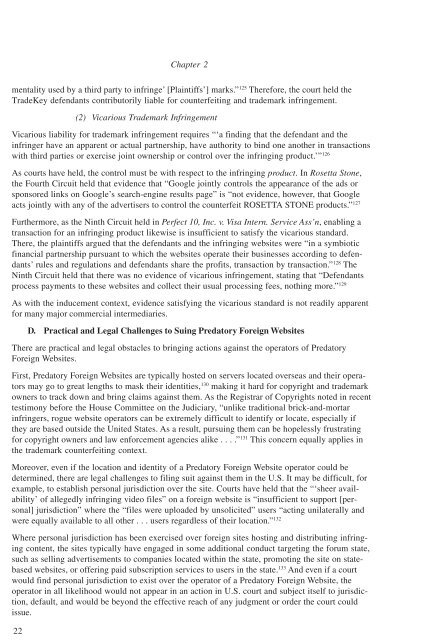1oz61wa
1oz61wa
1oz61wa
You also want an ePaper? Increase the reach of your titles
YUMPU automatically turns print PDFs into web optimized ePapers that Google loves.
Chapter 2<br />
mentality used by a third party to infringe’ [Plaintiffs’] marks.” 125 Therefore, the court held the<br />
TradeKey defendants contributorily liable for counterfeiting and trademark infringement.<br />
22<br />
(2) Vicarious Trademark Infringement<br />
Vicarious liability for trademark infringement requires “‘a finding that the defendant and the<br />
infringer have an apparent or actual partnership, have authority to bind one another in transactions<br />
with third parties or exercise joint ownership or control over the infringing product.’” 126<br />
As courts have held, the control must be with respect to the infringing product. In Rosetta Stone,<br />
the Fourth Circuit held that evidence that “Google jointly controls the appearance of the ads or<br />
sponsored links on Google’s search-engine results page” is “not evidence, however, that Google<br />
acts jointly with any of the advertisers to control the counterfeit ROSETTA STONE products.” 127<br />
Furthermore, as the Ninth Circuit held in Perfect 10, Inc. v. Visa Intern. Service Ass’n, enabling a<br />
transaction for an infringing product likewise is insufficient to satisfy the vicarious standard.<br />
There, the plaintiffs argued that the defendants and the infringing websites were “in a symbiotic<br />
financial partnership pursuant to which the websites operate their businesses according to defendants’<br />
rules and regulations and defendants share the profits, transaction by transaction.” 128 The<br />
Ninth Circuit held that there was no evidence of vicarious infringement, stating that “Defendants<br />
process payments to these websites and collect their usual processing fees, nothing more.” 129<br />
As with the inducement context, evidence satisfying the vicarious standard is not readily apparent<br />
for many major commercial intermediaries.<br />
D. Practical and Legal Challenges to Suing Predatory Foreign Websites<br />
There are practical and legal obstacles to bringing actions against the operators of Predatory<br />
Foreign Websites.<br />
First, Predatory Foreign Websites are typically hosted on servers located overseas and their operators<br />
may go to great lengths to mask their identities, 130 making it hard for copyright and trademark<br />
owners to track down and bring claims against them. As the Registrar of Copyrights noted in recent<br />
testimony before the House Committee on the Judiciary, “unlike traditional brick-and-mortar<br />
infringers, rogue website operators can be extremely difficult to identify or locate, especially if<br />
they are based outside the United States. As a result, pursuing them can be hopelessly frustrating<br />
for copyright owners and law enforcement agencies alike . . . .” 131 This concern equally applies in<br />
the trademark counterfeiting context.<br />
Moreover, even if the location and identity of a Predatory Foreign Website operator could be<br />
determined, there are legal challenges to filing suit against them in the U.S. It may be difficult, for<br />
example, to establish personal jurisdiction over the site. Courts have held that the “‘sheer availability’<br />
of allegedly infringing video files” on a foreign website is “insufficient to support [personal]<br />
jurisdiction” where the “files were uploaded by unsolicited” users “acting unilaterally and<br />
were equally available to all other . . . users regardless of their location.” 132<br />
Where personal jurisdiction has been exercised over foreign sites hosting and distributing infringing<br />
content, the sites typically have engaged in some additional conduct targeting the forum state,<br />
such as selling advertisements to companies located within the state, promoting the site on statebased<br />
websites, or offering paid subscription services to users in the state. 133 And even if a court<br />
would find personal jurisdiction to exist over the operator of a Predatory Foreign Website, the<br />
operator in all likelihood would not appear in an action in U.S. court and subject itself to jurisdiction,<br />
default, and would be beyond the effective reach of any judgment or order the court could<br />
issue.


